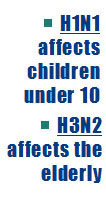Sunday, January 27, 2019 ~ BC.
~ West Shore Voice News
Incidences of H1N1 flu infections in BC (2018-2019 season) peaked around the end of December 2018. But flu activity continues, as normally expected, says the BC Centre for Disease Control (BCCDC). Flu season usually falls off around the end of March.
Children under age 10 and non-elderly adults comprise 75% of all H1N1 detections this season, with young children being hardest hit (they lack natural immunity from the 2009 H1N1 pandemic).
Elderly adults are over-represented among H3N2 detections, accounting for 64% of detections so far. An unknown flu subtype outbreak has been reported in one long-term care facility, said BCCDC in their weekly report that was issued January 24.
This year’s flu vaccine is considered substantially effective at being 72% effective against H1N1 this flu season. Last year the overall vaccine effectiveness fell below 25%.

A new Avian flu (H7N9) emerged out of China in 2013, showing an upsurgence after Oct 2016 and by May 2017 had caused at least 573 deaths, mostly among older men exposed to live poultry. Human-to-human transmission is not ruled out, says BCCDC. Illness requiring medical care within two weeks of return to Canada is communicated abroad for investigation.
Links:
BC Provincial Health Officer says BC falling short on mental health outcomes and dealing with the impacts of poverty on overall health (as published on page 3 in the January 25, 2019 print/PDF issue of West Shore Voice News)
Taking the Pulse of the Population: An Update on the Health of British Columbians (report)
BC’s Guiding Framework for Public Health
New Canada Food Guide shifts to general guidelines
~ West Shore Voice News editor Mary P Brooke holds a B.Sc. in nutrition science with an emphasis on community health education and optimal prenatal nutrition.



